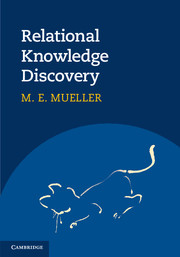4 - Clustering
Published online by Cambridge University Press: 05 July 2012
Summary
If we are given 5 pebbles, 3 marbles, 4 dice, and 2 keys, then we have 14 little objects of 4 different kinds. We also have 8 objects made of stone, 4 made of wood, and 2 made of metal. And we have 7 toy objects, 2 office tools, and 5 things we have collected during our last walk at the beach.
In the previous chapters, we saw that relations can be used to represent knowledge about sets of things. We also discovered that learning means to find a suitable set of relations with which we can describe or define concepts (see Definition 2.37). Now we describe a first approach to efficiently discover relational concept descriptions. Our starting point is an information system with a feature-based representation of the objects in our domain.
Concepts as sets of objects
Our working hypothesis is that knowledge is the ability to discriminate things and learning is knowledge acquisition. Therefore,
Learning means to acquire the ability to discriminate different objects from each other.
There are, in general, two different methods to group similar objects together and distinguish them from other groups of entities:
Building sets or classes of objects that we assume to share certain properties by grouping them into the same cluster
Inducing a concept that serves as a description of a representation class in terms of properties of objects.
- Type
- Chapter
- Information
- Relational Knowledge Discovery , pp. 76 - 91Publisher: Cambridge University PressPrint publication year: 2012



